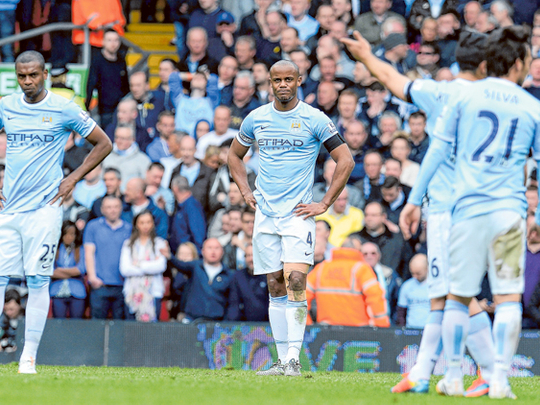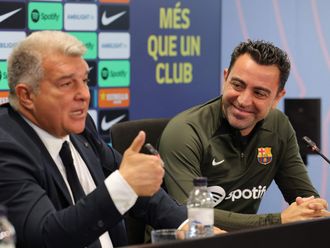
London: Manchester City manager Manuel Pellegrini has no regrets about selecting captain Vincent Kompany to play in last weekend’s costly 3-2 loss at Premier League title rivals Liverpool, he said on Wednesday.
A training-ground injury scare had put Kompany’s participation in doubt and although he was ultimately passed fit to play, he produced an uncharacteristically error-strewn performance.
The Belgian centre back was partly at fault for Liverpool’s first two goals and directly responsible for the hosts’ 78th-minute winner, when his sliced clearance enabled Philippe Coutinho to score.
Defeat left City seven points below the league leaders, albeit with two games in hand, but Pellegrini does not believe that his decision to pick Kompany was a mistake.
“He started the game because he is the captain,” said the Chilean, ahead of City’s home game with Sunderland on Wednesday.
“He made all the proof before the game, he said he was OK, and the doctor said that, so I don’t regret that. But I don’t like to analyse individual performances with the media.
“I talk with the players and when we win or lose, it is the responsibility of the whole team.”
Kompany is expected to line up against Sunderland at the Etihad Stadium, while top scorer Sergio Aguero is also available after making his return from a five-game absence with a hamstring injury at Anfield.
Key central midfielder Yaya Toure has been ruled out for up to two weeks after hurting his leg against Liverpool, but Pellegrini believes the squad has sufficient depth to cope in his absence.
“We have played the whole season with a lot of injuries,” Pellegrini said. “Now we have Yaya. We’ve had Kompany, Aguero, [Samir] Nasri. We were the only team that continued in the four competitions because we had an important squad and a lot of those players played well.
“He’s an important player, one of the most important we have in our team. But we have a squad and must replace him in this moment. I am sure we are going to do it with no problem.”
Meanwhile, City are becoming increasingly nervous that they will be one of the first major European clubs to be found in breach of Uefa’s financial fair play rules.
European football’s governing body yesterday examined the finances of about 20 clubs who they feel need close examination with regards to FFP. That process — which also includes Chelsea and Paris Saint-Germain — continued on Wednesday.
Though City were confident when they released their latest annual figures at the end of January that they had done enough to squeeze the right side of Uefa’s guidelines, they have become less certain over recent weeks.
Officials at the world’s richest football club are unsure about how Uefa view their attempts to add extra revenue streams to their vast business in the last 12 months and are awaiting news with some trepidation.
If City are found to be in breach, they are likely to be fined rather than banned from European competition.
Uefa have indicated all along that they are likely to look favourably on clubs who have made genuine efforts to reduce their losses when it comes to deciding on punishment. City certainly fall into this category, having cut their annual deficit from £98 million (Dh601.5 million) to £52 million over the course of the last two financial years.
Part of that has come through reining in their transfer spending, which has fallen since 2011, when they set a club record with the £38 million signing of Sergio Aguero.
City’s official stance on Tuesday was that they have received no indication from Uefa as regards what may happen.
Nevertheless, at the heart of the club’s anxiety is Uefa’s investigation into City’s unusual decision to sell £24.5 million worth of player image rights to an external company. That has never been done before by a leading English club and the interest in the manoeuvre has been heightened by the fact City have declined to reveal the company’s identity.
City are also aware that Uefa are examining the way in which the club raised £22.45 million from selling their intellectual property rights to outside parties. It is thought this figure includes charging affiliate clubs New York City FC and Manchester Ladies FC for the use of City’s scouting and commercial services. Finally, Uefa are known to be looking at the structure and market value of the 10-year, £350 million deal City struck with Etihad in 2011 to sponsor their stadium, shirts and new training complex.
City are confident that everything they have done to reduce the losses created by the colossal spending of the last five-and-a-half years is above board and able to withstand the most rigorous examination. If they are found in breach of FFP, they may well appeal.
Once Uefa’s club financial control body have met this week they will write to clubs telling them they have passed or failed and offering those in breach a punishment or `settlement’.
The clubs will then have until April 30 to accept the sanction or appeal. Uefa would expect to deal with any appeals by May 5 but the matter could in theory drag on all summer if affected clubs appeal to the Court of Arbitration for Sport.
Uefa’s FFP guidelines say clubs must keep losses to an aggregate of £37.2 million over the 2011-12 and 2012-13 seasons and although City’s figure stands at £149.5 million, the regulations contain two significant loopholes for clubs looking to prove they are making concerted efforts to reduce their losses.
The first is that any club who reduce their deficit between the last two seasons are allowed to write off the wages of any player signed before 2010.
Any spending on youth development, infrastructure and community projects over the past two years’ accounts is also deductible for FFP purposes.
Uefa president Michel Platini, who has driven FFP from its inception, has spoken publicly about throwing clubs out of European competition if they fail the tests but the truth is that Uefa only intend to apply this to repeat offenders.
One further issue that City will also be aware of, though, is that other European clubs can appeal if they think their rivals’ finances have not been examined properly.
Teams like Manchester United and Arsenal, for example, are keen that Uefa implement the rules as stringently as they said they would when FFP was first launched five years ago.











